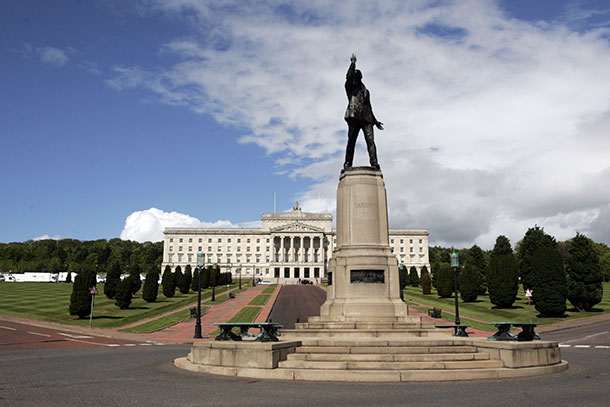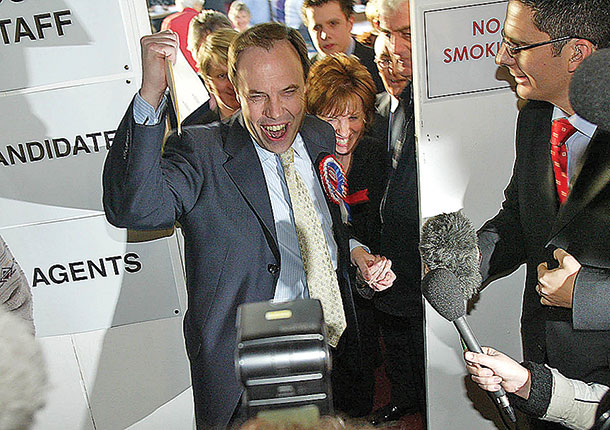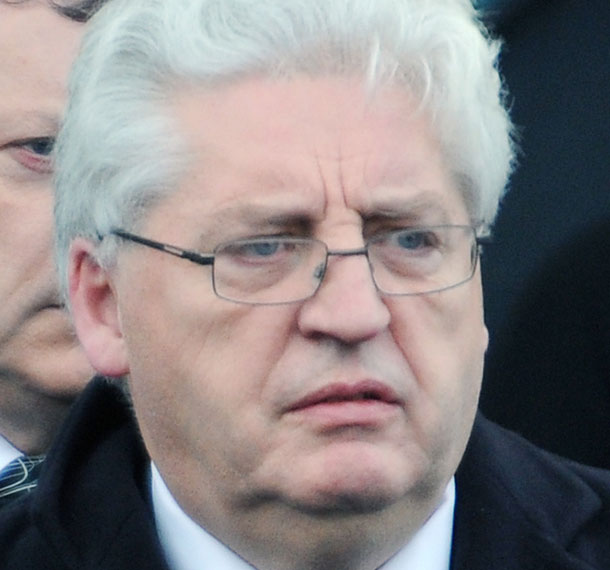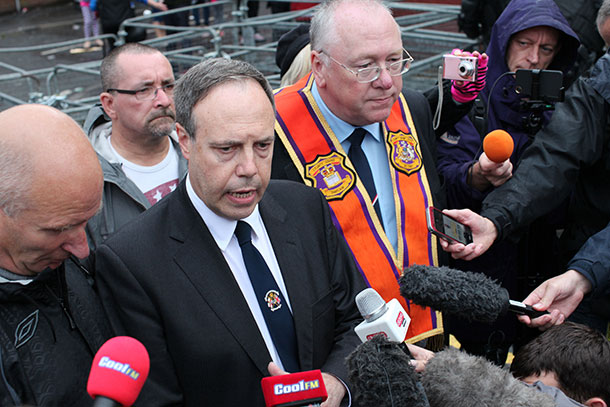1 December 2014 Edition
POW Avenue – A path well-worn
Gerry Kelly MLA: Former IRA Volunteer, prison escapee and hunger striker talks to An Phoblacht in the old unionist bastion of Stormont

Our objective is about making progress and, realistically, in North Belfast it is only Sinn Féin that can win the seat for the pro-Agreement side
ARRIVING at Stormont to meet Gerry Kelly and with the car parks full, I have to park halfway down the long hill that leads to Parliament Buildings.
As I struggle up the hill that stops below the figure of the unionist demigod Edward Carson, I text the North Belfast MLA. I borrow Barry McElduff’s soubriquet for the road that’s officially called Prince of Wales Avenue. “I’m on POW Avenue.”
Carson’s figure towers over the Stormont estate in a domineering pose that once reflected the power of an unassailable, unionist ruling elite. It was symbolic of the Orange State.
I’m transported back to the first time I struggled up this same hill.
It was almost 20 years ago, shortly after the IRA’s 1994 announcement of its cessation of military operations. A Sinn Féin delegation travelled to this citadel of unionism to hold talks with representatives of the British Government.
Gerry Kelly was a member of the delegation that included Martin McGuinness, Seán MacManus from Sligo (Seán’s son, Joe, was killed on active service with the IRA in Fermanagh in 1992), Siobhán O’Hanlon (who died of cancer in 2006) and the Dublin-based Sinn Féin General Secretary, Lucilita Bhreatnach.

Back to today.
Gerry Kelly meets me in the Great Hall. He’s toing and froing between the all-party talks involving the two governments under the stewardship of US Senator Gary Hart. It adds to the buzz and frenetic activity all around us.
As we walked towards the lift we meet MLAs Seán Lynch from Fermanagh, Daithí McKay from north Antrim, Cathal Boylan from Armagh, and Rosie McCorley from west Belfast.
On the third floor, the ubiquitous Barry McElduff wanders out of his office, trying to pick his way through the crowd of secondary school students and their Sinn Féin chaperones, clearly on a trip to ‘the seat of power’.
As I sit down in Gerry Kelly’s office, he says to me: “So, we’re here to talk about North Belfast?
“Well, the seat is very winnable. The demographics have changed and it’s fair to say they have changed more than in other areas.
“The census figures tell us that and also if you look at Belfast as a whole we can see that the nationalist population is increasing while the unionist population is decreasing.
“Also,” Kelly continues, “the figures from the last election, when Nigel Dodds’s majority was just 2,246, is a clear indication that the seat is winnable.”
Not someone to leave things to chance, the North Belfast representative raises the need for Sinn Féin’s election teams to focus on and prioritise the 5,000 to 6,000 non-voters in nationalist areas.

• Nigel Dodds’s majority in the last election was just 2,246
“We are on the streets at the minute and have been for a while. We have rolling canvasses knocking doors across the constituency and the feedback is good, but we want the people who don’t vote to come out.”
The big issue of a Sinn Féin/SDLP electoral agreement to maximise the pro-Agreement political representation is in the news.
“Martin McGuinness first raised the question of an electoral arrangement with, first and foremost, the SDLP on 13 November.
“He was also appealing to pro-Agreement and progressive parties to discuss the possibility of arrangements that would thwart what he called the ‘anti-Agreement axis’ of the unionist parties backed by the Orange Order, the UVF, the UDA and UKIP.
“Martin also focused on the fact that these anti-Agreement parties are also in favour of the welfare cuts being pushed by the Tories from Westminster so he was appealing to progressive parties as well.”
The SDLP rejected it out of hand.
“I was very disappointed with the response of SDLP leader Alasdair McDonnell to Martin’s call for co-operation, particularly in my own North Belfast constituency but also in Upper Bann and Fermanagh & South Tyrone.
“To describe what Sinn Féin is proposing as a sectarian headcount is to completely ignore what Martin said.

• Alasdair McDonnell
“We want progressive, pro-Agreement parties to stand together and defend the Good Friday Agreement in face of this anti-Agreement axis.
“This anti-Agreement axis has really gelled together under the auspices of flag protesters and the Orange Order. They are trying to block progress in the talks until an Orange march is allowed to go through Ardoyne. Under pressure from the extremes in loyalism, they scuppered the Haass proposals.”
The latest round of talks under the auspices of US Senator Gary Hart is underway at Stormont but with the schisms within unionism and the DUP clearly in election mode (looking over their shoulders at their ‘allies’ in Jim Allister’s hardline Traditional Unionist Voice, the Orange Order, UVF and UDA), progress is painstakingly slow.
“The SDLP leader’s position is also short-sighted,” Gerry Kelly sighs, “given that the unionists are talking of pacts and are targeting McDonnell’s own seat in South Belfast but their real target is to unseat Michelle Gildernew in Fermanagh & South Tyrone.”
Gerry Kelly is adamant that Sinn Féin’s objective is aimed at “moving the Peace Process forward” and ensuring that the agreements (Good Friday, St Andrews, Leeds Castle, and Hillsborough) – “all of which the unionists signed up to” – are implemented in full.
“Our objective is about making progress and, realistically, in North Belfast it is only Sinn Féin that can win the seat for the pro-Agreement side.
“The SDLP’s vote over the years has been shrinking and [SDLP MLA] Alban Maginness gets a smaller vote than both Carál Ní Chuilín and I get in the Assembly elections.
“In the 2010 Westminster election, the Sinn Féin vote was 12,588 or 34% of the poll, whereas the SDLP tally was 4,544, just 12.3%.
“With the Ulster Unionist Party saying they want to prevent North Belfast falling into the hands of Sinn Féin it would seem logical that the SDLP should give us a clear run at it.
“The North is changing and people want to see those changes having a positive effect on their lives. What we are challenging is a unionist, conservative philosophy that sees the DUP willing to implement Tory cuts to the detriment of the most vulnerable in society.
“And these Tory cuts come from a right-wing ideology that has always attacked the welfare state and the working class (including the unionist working class), who need it most.”

• The DUP have been looking over their shoulder at Jim Allister's hardline TUV, the Orange Order, UVF and UDA
Just before the DUP party conference on 22 November, First Minister Peter Robinson and other DUP leaders spoke of how the DUP might hold the balance of power in Westminster after next May’s general election.
To Gerry Kelly this is a case of the DUP letting the cat out of the bag.
“Essentially, they are saying they are willing to put a Tory millionaire government back into power regardless of the impact of their policies on the people who are the worst off in society. And remember it is those in low-paid work who are the most affected as it is the tax credits which boost their wages that are being cut.
“Taking this all into consideration it would be fair to say this coming election could also be seen as a referendum on the welfare cuts.
“And working-class unionists who vote DUP are suffering as much as anyone.”
Of course, Gerry Kelly is also standing on the party’s record of solid and committed constituency work and representation of the electorate.
Over the years, Sinn Féin’s political opponents, particularly the SDLP, have raised the party’s refusal to swear the oath of allegiance and loyalty to the British monarch at the Westminster parliament as a sign that Sinn Féin doesn’t represent the electorate effectively.
Laying that to rest, Gerry Kelly is emphatic when he declares, his eyes burning bright: “We deliver.”
He continues:
“Whether it’s at council level, at the Assembly or at Westminster, Sinn Féin provides a service that is second to none.
“The other parties go to Westminster and sit in the middle of over 600 British MPs who, generally speaking, don’t care about what goes on over here.
“Sinn Féin has offices there and we go there to represent our constituents. We work effectively but we don’t swear allegiance to the British crown.”
As our interview closes, Kelly has to rush off to ask a question of Regional Development Minister Danny Kennedy but not before he adds:
“No section of our community should face discrimination.
“Equality is our watchword so anybody who faces discrimination – whether as a consequence of their religion, the colour of their skin or race, their gender or their sexuality or if they are disabled – should know that Sinn Féin supports them.”
As I make my way back to ‘POW Avenue’ it occurs to me that the North has changed from the time when both Belfast City Hall and Stormont were symbols of unionist omnipotence to now, where nationalists are becoming more influential.
If Gerry Kelly wins North Belfast and both Naomi Long and Alasdair McDonnell hold their seats with Paul Maskey returned in West Belfast, then none of the Belfast constituencies will have an MP from the main unionist parties.
This will be a major blow to the old unionist psyche of domination, especially when the last Ulster Unionist MP for North Belfast was Cecil Walker who, in 1997, polled 21,478 votes with 51.8% of the vote compared to a combined nationalist vote of 16,829 (40.6%).
More importantly, such a scenario will be a huge statement in favour of pro-Agreement politics and progress, against the negativity of the hardline unionism that belongs in the past.
The potential for real change is there for pro-Agreement and progressive voters across the North. Let’s hope they make that choice.




